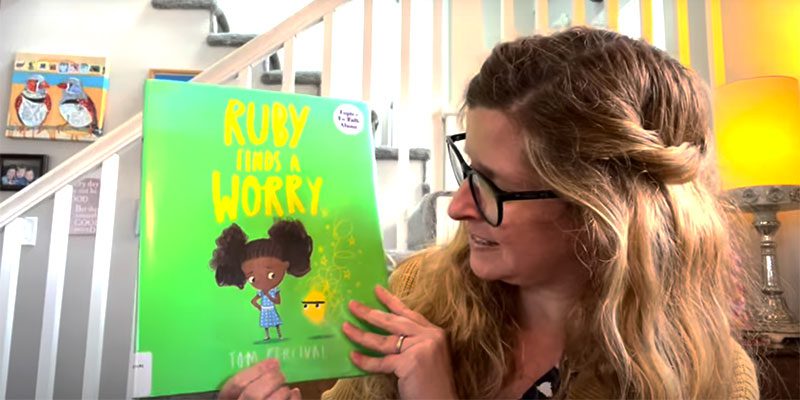By Shelley Harris, Children’s Librarian
Scary things are back in the news. Even when we try to insulate children from the news, we often underestimate how much they can overhear and how much they can pick up on tension in their caregivers. It’s very challenging for kids and adults when kids get worried and have big emotions but don’t understand what is happening.
How can you check in with their feelings without accidentally introducing them to the very things you are trying to protect them from? Let’s go through some resources.
Videos to share
This recent video featuring Community Engagement Coordinator Jenny (pictured above) discussing the worries preschoolers have been sharing with her is a great place to start.
“If You’re Worried and You Know It” is an easy way to segue into emotion check-ins.
Scary Things in the News was filmed after the January 2021 DC insurrection, explained as angry people making bad decisions that hurt others. This conversation can be used as a model for other scary news.
About the video from Miss Jenny
“In this video, it was really important that Ruthie (the child) led the conversation and that we modeled going at a pace that felt safe for her, so as not to cause any additional fear or trauma.
“Ruthie also shared activities that help her process. I used processing art or movement a lot in my previous role as a teacher and continue to use it in my role at the library, so I wanted to model this as well. Through experience, I have discovered that processing art and movement helps children process feelings and sometimes is a way to foster conversation.”—Jenny Jackson, Community Engagement Coordinator
Resources for caregivers
Unsurprisingly, PBS is full of excellent advice for navigating situations like this. Fred Rogers Productions has plenty of tips, including:
- “Give your child extra comfort and physical affection, like hugs or snuggling up together with a favorite book. That closeness can nourish you, too.”
- “Let your child know if you’re making a donation, going to a town meeting, writing a letter or email of support, or taking some other action. It can help children to know that adults take many different active roles and that we don’t give in to helplessness in times of worldwide crisis.”
Find more tips and activities in the articles below:
- Eric Rasmussen, PhD, highlights the importance of listening and reassuring young children.
- An advisor on PBS’s Arthur for many years, Dr. Paula K. Rauch, MD shares answers questions about how to speak with children during challenging times and upsetting events.
- Rocky Mountain PBS offers a number of resources, including discussion on how it can be beneficial for children to know that adults get worried too, as well as a “keep calm trick” for kids and grownups to do together.
- NPR also has a recent article—available with audio—featuring tips from child development experts. They have ideas on language to use (including not using the words “bad guys” or “evil”), tips on processing emotions together, and how to create safe reflection spaces for children.

About Shelley
Shelley is a children’s librarian with a passion for early literacy, serving and celebrating the disability community, and exploring technology. She can often be found practicing storytime songs with her black lab, Bingo.

